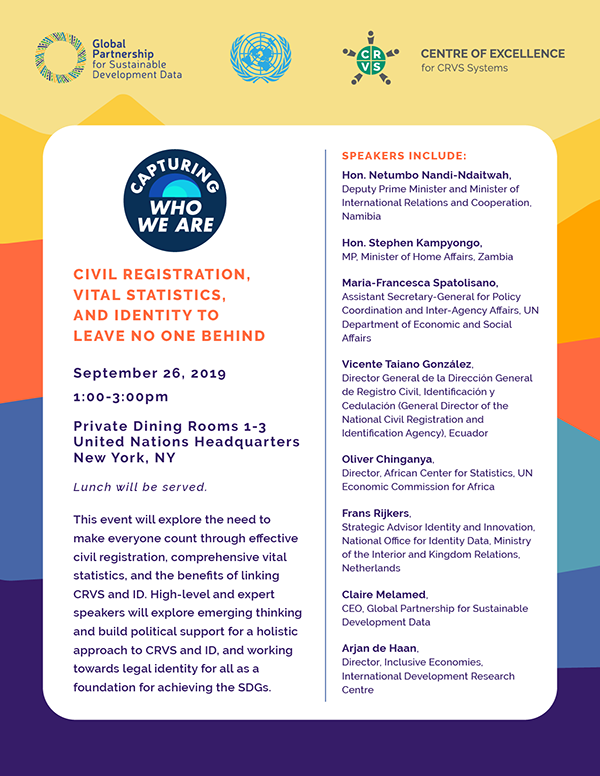Demographic and Social Statistics
Meetings
Capturing Who We Are: Civil Registration, Vital Statistics, and Identity to Leave No One Behind
- UNHQ, New York, United States of America
- 26 September 2019
Overview
The 2030 Agenda for Sustainable Development reflects a unique global consensus and commitment to address the world's most acute and pressing challenges to leave no one behind. Four years after the SDGs were agreed, heads of state and government will return to the United Nations under the auspices of the 74th Session of the United Nations General Assembly (UNGA) for multilateral discussion of international issues and for the first time host the SDG summit to allow a detailed assessment of the progress towards achievement of the global goals.
Goal 16, Target 16.9 commits that by 2030 (countries will) provide legal identity for all including birth registration. Legal identity is the basis for realizing many basic rights and opportunities.
To achieve the Sustainable Development Goals, and to leave no one behind, everyone in the world should be protected by the state, so that she/he can fulfill her rights and obligations, and also be captured in data that can be used by governments to measure progress and make evidence-based equity-oriented decisions to improve people's lives. The Secretary-General's SDGs Progress Report for 2019 highlights key gaps in birth and death registration, particularly in Africa.
The coverage of birth and death registration and the completeness of vital statistics remains a challenge, even among countries with functioning civil registration systems. According to the 2019 SDGs Progress Report, the average birth registration globally is just 73 percent, and less than half (46 percent) of all children under five in sub-Saharan Africa have had their births registered.[1] Latest data from the World Bank estimates that 1 billion people cannot legally prove who they are for lack of legal identity documentation. These figures show how far behind we are in providing people with the fundamental pathway to accessing basic rights and opportunities.
To a large extent, we are lagging in this commitment because of underinvestment in civil registration and vital statistics and other identity management systems. Even as new identity systems are rolled out and digital technology is introduced, many countries have failed to strengthen these foundational systems. This perpetuates many inequalities, exclusion and marginalization, poor planning and service delivery, and public resource wastage.
Strengthening CRVS through a holistic approach and integrating civil registration with ID systems can contribute towards ensuring that everyone is counted and that the SDGs deliver a life of dignity for all.
Objectives
This event, co-hosted by UN DESA Statistics Division, The Centre of Excellence for Civil Registration and Vital Statistics Systems and the Global Partnership for Sustainable Development Data, will frame the need to make everyone count through effective civil registration, comprehensive vital statistics, and the benefits of linking CRVS and ID. Objectives include:
- Demonstrate the value of investing in CRVS and integrating it with ID through practical country examples;
- Explore emerging thinking and build political support for strengthening CRVS, integrating with ID and working towards legal identity for all as a foundation for achieving the SDGs.

